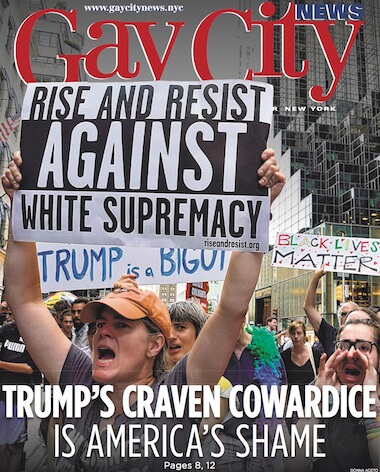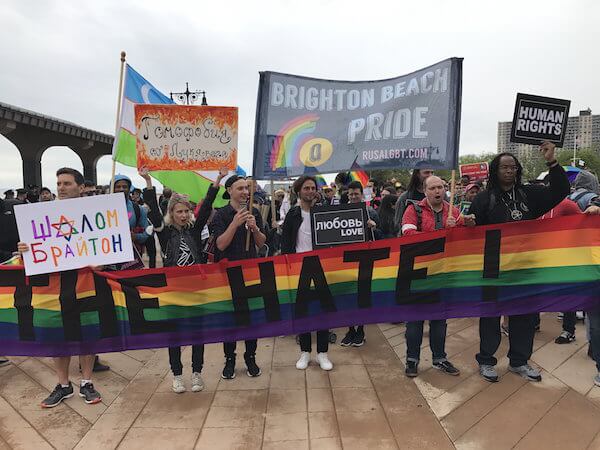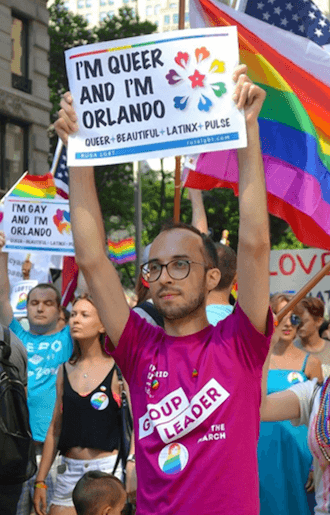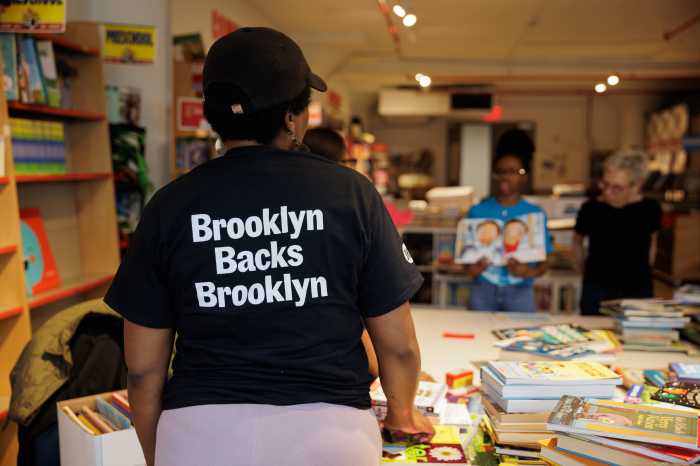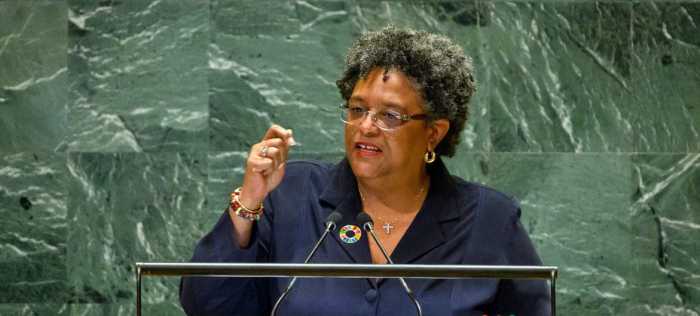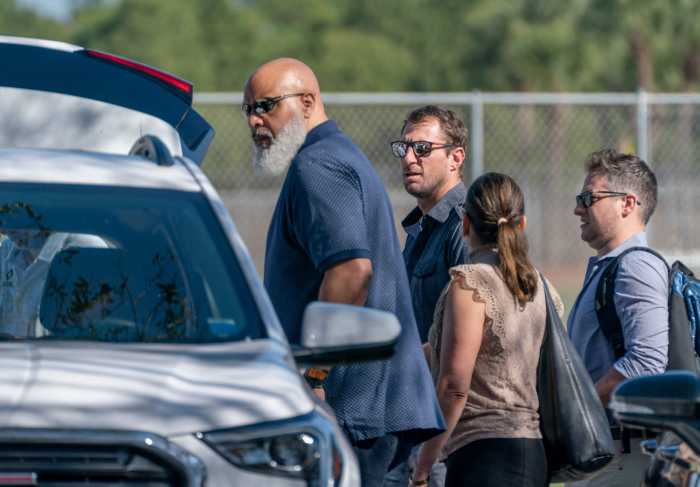Randy Berry (center), the US State Department special envoy for the human rights of LGBT persons, with Jonathan Posner, a US Embassy official in Riga, at the June 20 Europride March.| MICHAEL LUONGO
BY MICHAEL LUONGO | Rights, religion, and Russia weighed heavily on the minds of attendees at the two human rights conferences held during the June 15 to June 22 Europride events in Riga, Latvia.
The first conference, entitled LGBTQ Movements in Central and Eastern Europe: Successes, Challenges, Perspective, took place on June 17 and 18 and focused on the struggles of activists in post-Soviet regions, with speakers from Russia, Ukraine, Georgia, Hungary, Poland, Armenia, Lithuania, Latvia, the Czech Republic, and Kyrgyzstan.
Regional activists agreed with those from the West that Russia’s law banning LGBT “propaganda” was setting an unfortunate example for other countries in the former Soviet bloc. Lithuania recently passed such a law, a point of deep concern for Shawn Gaylord, an advocacy counsel on LGBT rights at the Washington-based Human Rights First.
The war in Ukraine, Putin’s shadow center stage at June gatherings in Riga
“Our focus as it relates to Russia is on the propaganda laws,” he said. “I am mostly interested in how these laws are playing out in the region. Lithuania now has a law similar to that of Russia.”
A copycat law proposed in Kyrgyzstan, he noted, had been killed.
Syinat Sultanalieva, active with the Kyrgyzstan LGBT rights group Labrys, explained that her country is the most democratic of the region often called “the Stans” by outsiders. Even the attempt to advance such legislation, however, is an example of how “Russia has a huge influence and would have allowed the Russian activity against gays to be more promoted,” she said.
While Kyrgyzstan is largely a Muslim country, Sultanalieva said, its government is officially secular. An Islamic movement has been emerging, she said, but remains insignificant compared to other Central Asian and Middle Eastern countries.
“There is a strong resistance to this type of Islam,” Sultanalieva said. “We have a strong civil society fighting to keep the secular state.”
Tamas Dombos, an activist with Hungary’s Hatter Society, an LGBT rights group, argued that “religious dynamics are different in every country” in the former Eastern Bloc, but the spectrum does not conform easily to the way Westerners think about the issue. Czeslaw Walek, from the the Open Society in the Czech Republic, said his country was among the least religious in Europe.
“If you have to compare Czech relations with the rest, we are ahead,” with polls showing 50 percent of the population comfortable with LGBT issues, said Walek, who heads up Prague Pride, the nation’s largest annual LGBT gathering.
The Freedom Conference, which followed on June 19, took on a more global perspective — including Ted Talk-style presentations from web experts and government representatives — but Russia continued to loom large. Baiba Braze, a senior Latvian government foreign affairs official, read a message of greeting from her boss, Edgars Rinkevics, that nation’s foreign minister who recently came out as gay.
Boris Dittrich, the LGBT rights program advocacy director at Human Rights Watch, told Gay City News that Russia’s “[Vladimir] Putin has a very strong hold. Latvia is an interesting case because 40 percent of the people are Russian speaking.” That leaves an opening in the event Putin were to create unrest as a pretense for an invasion using “the same large heavy hand as he did in the Ukraine. That is why people are afraid.” The US and its NATO allies have announced a plan to stock weapons in Latvia in light of such a possibility.
Levan Berianidze, the education officer at Georgia’s LGBT right group Identoba, voiced similar fears for his own country.
“Coming here means I understand very similar processes are going on in the region, in the post-Soviet countries,” he told Gay City News. “LGBT issues have become a scapegoat.” Berianidze added that Georgia is examining the question “Are we bringing ourselves into Europe, or to Russia?”
Shevchenko_Insight_Ukraine_LUONGO_LATVIA.JPGUkrainian activist Olena Shevchenko at the Europride Rally. | MICHAEL LUONGO
Ukrainian activist Olena Shevchenko, who works with the group Insight, offered examples of the havoc Russian intervention can create. Her organization runs a shelter for LGBT IDPs, or Internally Displaced Persons, seeking refuge from the battles and violence in eastern Ukraine.
Andrea Wiktorin, the German ambassador to Latvia, noted that Europride fell close to the anniversary of a major East German uprising against the Soviet regime. On June 17, 1953, a million East Germans took to the streets.
“Crowds had gathered that day to show that they were fed up with the communist regime. They wanted democracy,” said Wiktorin, who acknowledged that the event did not lead to the overthrow of the Soviets.
However, on August 23, 1989, she continued, two million residents of the three Baltic states joined hands against communism, while marking the 50th anniversary of the Molotov–Ribbentrop Pact between the Soviet Union and Nazi Germany. That event was among many regional revolts in 1989 that finally destroyed the Iron Curtain.
Despite those examples of resistance, Wiktorin warned that assaults against freedom continue to occur and that even in a democracy, citizens “cannot always take their rights for granted.”
In his speech to the Freedom Conference, Randy Berry, the US State Department special envoy for the human rights of LGBT persons, also discussed assaults on LGBT rights, though he did not directly refer to Russia.
“In the past two years, we have seen laws enacted and proposed in several countries around the world that seek to restrict the public discussion of sexual orientation under the guise of protecting minors from information on so-called non-traditional sexual relations,” Berry, who is gay, said. “These laws, sometimes called anti-propaganda laws, are often vaguely worded and arbitrarily restrict the rights of freedom of expression and assembly. They also contribute to the ongoing persecution of members of our community, including persons who are identified or are perceived as LGBTI.”
Berry continued, “Government-sponsored anti-LGBTI initiatives, like propaganda bans, suggest that homophobia is, in fact, officially sanctioned in these places. And in some cases, it encourages those who would act violently on such prejudice. Prohibiting expression of support for LGBTI individuals is not the way to promote social harmony; rather, it can lead to great intolerance, discrimination, societal unrest, and in some cases, in too many cases, violent assault.”
Berry also pointed to “recent and proposed legislation against quote-unquote foreign agents [that] requires that [non-governmental organizations] that receive funding from abroad register as foreign agents themselves. This is a problem, because oftentimes, most of the time, the best work in this space is done by civil societies. They have the best knowledge of what’s happening on the ground, and these partners need to have space, freedom, and the resources to act.”
Braze, the Latvian foreign affairs official, told Gay City News that “Everybody is under the influence of Russia. It’s not something unique to my country and the Baltic region.” But, she voiced confidence that Latvia can withstand challenges and provocations from Russia.
“The resilience of our society is as a democratic, free, open society,” said Braze, who explained that under the Latvian constitution, “equality applies to everyone no matter what origins they have.”
Latvian freedom is personal for her, Braze explained.
“I spent the first 24 years of my life under Soviet rule,” she said. “It is a thing that nobody wants to go through. But it is also a thing to know what it was like when you are not free.”
The young LGBT activists who marched in Riga the following day are not old enough to remember communism, but they still fear the violence and repression that parades in earlier years were met with. Braze voiced confidence that her country’s government “will guarantee this value and the safety of the marchers. The right to have the Pride is the right for all of us in Latvia.” The peaceful manner in which Riga Pride unfolded the next day bore Braze out in her confidence.
Michael Luongo’s stories on the Europride celebration appeared in the June 25 issue of Gay City News and can be found at here and here. .




